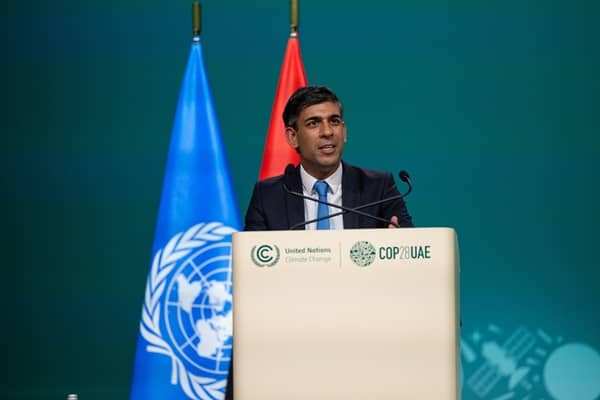As world leaders at COP28 are expected to commit to tripling global renewable electricity capacity by 2030, common policy barriers are hampering the rollout of those renewables in some of the world’s biggest economies.
This is according to a new report Financing the Energy Transition: How Governments Can Maximise Corporate Investment, by international non-profit Climate Group.
Climate Group’s RE100 initiative works with over 400 companies with a combined electricity demand larger than France, committed to using 100% renewable electricity across their global operations. They are investing billions of dollars to achieve that, but policy and regulatory barriers are stopping corporates from investing in renewable electricity in many markets. This has knock-on effects on the phase out of fossil fuels, Climate Group said.
The report, launched today at COP28, highlights common policy gaps that are holding back eight G20 economies, presenting them as examples of challenges faced by many countries around the world. The report, which focuses on Argentina, China, Japan, Indonesia, India, Mexico, South Korea and South Africa, provides recommendations that would break down barriers, enabling countries to seize the economic opportunities of the energy transition and speed up the race to net zero.
In South Korea for example, 129 of the country’s 226 local governments (57%) have ordinances requiring solar facilities to be located at a minimum distance of anywhere between 100 to 1,000 meters from residential areas and roads – marking vast areas of the country off-limits to solar development.
“Renewables are the gold rush of the 21st century, but many businesses, states, regions, and countries are still missing out. The age of cheap fossil fuels is over, and it’s time for governments to take simple steps to open their markets to billions of dollars in corporate investment in cheap, clean renewable electricity. It’s great that countries are actively discussing tripling their renewable electricity capacity, but they’re going to have to break down barriers in their own countries to actually deliver on that promise”, said Sam Kimmins, Director of Energy at Climate Group.
The barriers identified in the report fall under three common themes. Firstly, the availability of renewable electricity in a country or region. Secondly, the accessibility of this electricity for corporate use.
Finally, the affordability of renewable electricity in some markets, which is often out of step with the vastly lower cost of renewable electricity elsewhere in the world. The challenges posed by restrictive regulatory environments and market barriers are also explored.
In the run up to COP28, calls for more action on the phase out of fossil fuels and stronger leadership from the world’s biggest economies have been increasing. Positive signs came earlier this year when G20 nations committed to pursue a tripling of renewable energy capacity globally by 2030 through existing targets and policies. To do this, it’s vital that governments remove the most common policy barriers that are locking in fossil fuels and slowing the global transition to net zero.
“With the renewable energy market expected to hit USD $2.15 trillion by 2025 and sustainable investment surpassing $35 trillion in 2020, market opportunities are huge for countries that work with businesses to prioritise sustainability and drive towards net zero. Continuing to promote fossil fuels, at the expense of renewables, or by not adequately supporting renewables through policies and market structures, is a dead-end road,” continued Kimmins.
The series of policy recommendations laid out in the report that countries can use to unlock the huge economic potential of renewables are:
- Establish an enabling regulatory environment for corporate sourcing and accessibility of renewables.
- Increase the transparency and additionality of renewable energy certificates (RECs).
- Ease complicated PPA processes, including addressing the lack of transparency and incentives.
- Understand and amend the geographic and regional disparities in the availability of PPAs and harmonise PPA rules and contract processes.
- Create a level playing field to ensure the affordability of renewables.
- Create a level playing field on which renewable electricity competes fairly with fossil fuel and reflects the cost-competitiveness of renewable electricity production.
- Remove fossil fuel subsidies to stop unfair competition with renewables and reduce the subsidy burden on taxpayers.
- Incentivise and increase supply to ensure sufficient availability of renewables.
- Work with utilities or electricity suppliers to provide and improve options for corporate renewable electricity sourcing.
- Address permitting and siting issues that are unduly limiting opportunities for installation of new renewable electricity infrastructure.
- Promote direct investments in on-site and off-site renewable electricity projects.
Besides South Korea, the report includes other examples where policies have a direct impact on private investment in a country’s energy infrastructure. In 2018, the year President Andrés Manuel López Obrador came to power, Mexico attracted $5 billion in foreign direct investment in its energy sector. By 2021 this was just $600 million – a fall attributed to investors being deterred by pro fossil-fuel rhetoric.
On the other side of the equation, South Africa’s Renewable Independent Power Producer Programme (REIPPP) has stimulated more investment in renewables development, with 256 billion South African Rand (USD$17.32 billion) being committed through the programme. South Africa’s grid however is struggling to incorporate it, showing the need to invest in infrastructure as well.
By adopting the recommendations in the report, countries could unlock billions of dollars in investment, with the overall goal of combatting climate change and helping countries reach their net zero targets.







Leave a Comment